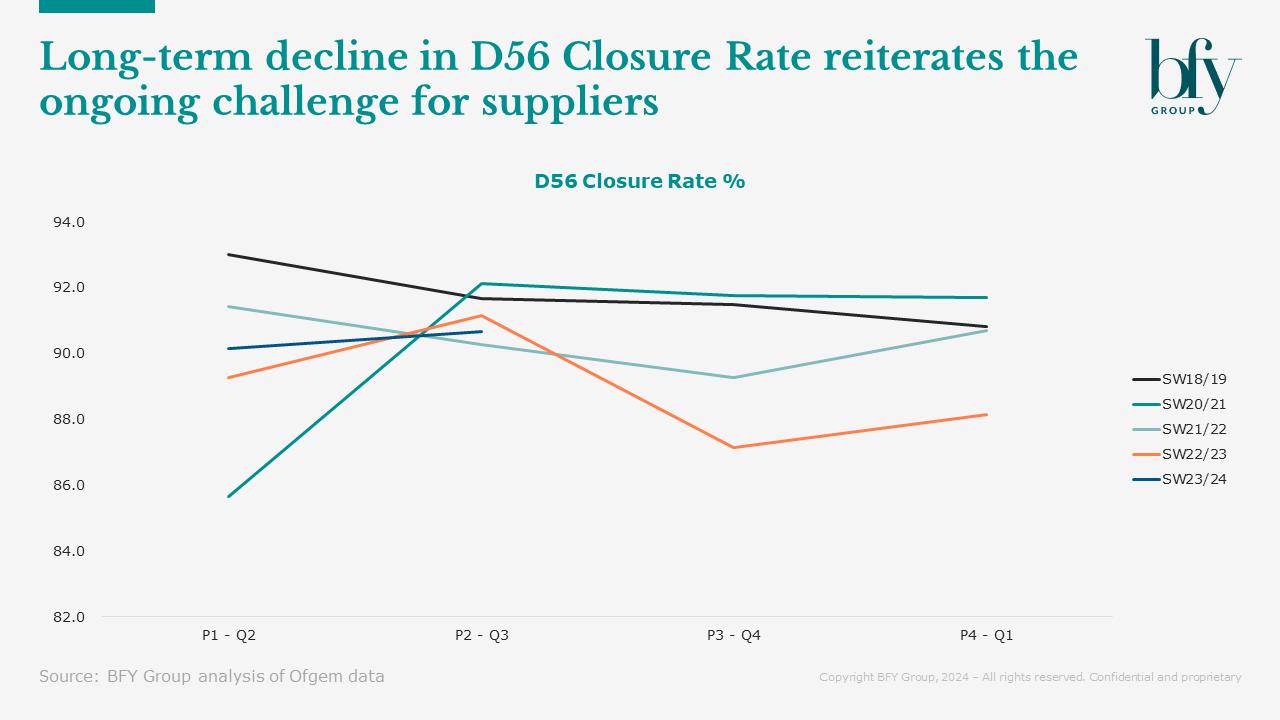Complaints challenges are set to continue in Q1. It’s a trend we’ve seen in recent years, that customers are more likely to complain during a period of high usage.
However, based on current market conditions, this year’s uplift could be more significant than usual. Customers have faced an average bill of ~£2,000 over the past few years, and with the Price Cap increasing in Q1-24, the pressure on households may be coming to a head.
In this update, we’ve analysed current and recent performance for Energy complaints, focussing on trends for Complaints Received, Same/Next Day Closures, Day 56 Closures, and Unresolved by D56.
We’ve also shared some lessons from the front line, reflecting on a recent complaints transformation with one of our clients.
Can we expect complaints to rise again in Q1?
During Summer/Winter – 22/23, we saw complaints rising to pre-pandemic levels, and while 23/24 has shown some reduction in Q2, sentiment suggests they’ll be back on the rise again in Q1, if a number of factors continue:
- Migrations – Three suppliers are now in the ‘hard yards’ of their migrations, which can exacerbate billing issues
- Payments – Q1-24 annualised Price Cap will be £1,928 with new, lower, Ofgem average consumption values, creating significant pressure for the lowest income households
- Smart – Suppliers are still struggling with non-comms smart meters, affecting as much as 20% of their portfolio
Improvements in Same and Next Day Closures
In Q2 23/24, two suppliers made significant improvements on Same and Next Day closure performance, driving up the industry average.
This is a great trend, but can be influenced by a number of factors – changes to approaches in recognising complaints, improved compliance around logging complaints – if these are simple complaints, then they can be resolved quickly and on the same call.
Day 56 Closure Rates remain a challenge for suppliers
The long term trend for closure rates by Day 56 is down, showing the difficulty suppliers are having. There are a number of instances where suppliers can do more to efficiently resolve complaints within the 56 day period, but often the hard complex complaints can’t be resolved in that window.
Anyone who’s worked in complaints will pretty much know the age of the oldest outstanding complaint off by heart, and it’s often not pretty.

Unresolved by D56 – Could we see a spike similar to 22/23?
Ofgem’s current reporting switches from Complaints per 100k Accounts into percentages, with the final metric being Percentage Closed by Day 56 - which shows the amount of complaints which were resolved.
For the past seven years, our preferred metric has been Unresolved Complaints by Day 56 Per 100k Accounts, as this gives us a levelised view of performance.
In 22/23, we saw the highest ever level of unresolved complaints per 100k accounts.
Third Party trends are fluctuating, but Ombudsman keeps rising
Complaints to Third Parties and the Ombudsman tell some interesting stories.
Third Party complaints (Citizens Advice, Advice Direct Scotland, and the Energy Ombudsman) rise into Q1-23 and then fall through the summer into Q3.
Ombudsman complaints however have seen continued significant rises.
We go into further detail on this in our complaints whitepaper, please contact Ian Barker if you’d like a copy.
Lessons from the front line
We recently undertook a complaints transformation for a large energy supplier, here’s some of the lessons they shared:
- Nail the operating rhythm – build the habits and consistency for success
- Get broader buy-in, this is a company wide problem to solve
- Move past MI reporting and into actionable insight
- Create urgency, and use agile ways of working
- Bring your outsourcers closer, and improve speed to competency
- Use predictive analytics and AI to find root causes, and control frameworks to track your portfolio health
- Get your team to set and own goals to drive performance
“BFY were brilliant at creating the operating rhythm for the recovery programme – we all recognised it would be challenging, but we were in this together as one team. The BFY team set the pace and helped my team see that what were trying to achieve was possible.”
“We had to get our broader Senior Leadership team clear and bought in on the upstream problems that were driving complaints, and have some tough conversations around accountability and performance – we’re one company, but unless you really make the effort you often don’t feel like ‘one team’ when you work in different functions. Using Operational Excellence techniques like ‘Going to Gemba’ (Visiting the shop floor) really brought to life upstream process failures.”
“You need to get actionable insight quickly. With the BFY team we would run sprints based on the top actionable root causes – creating urgency to deal with a batch of common root complaints, working and influencing upstream to fix the processes, and building sustainable capability to permanently keep the inflow volumes down.”
“Many suppliers have outsourced large parts of their operation, and we were no different. Many of the outsourced team were inexperienced – by bringing them closer to the onshore operation we were able to accelerate their speed to competency. Having the BFY team here to facilitate feedback and coaching was invaluable.”
“In complaints, the hard things are hard - billing, metering etc. It’s often not something you can just fix within 48 hours in an escalated complaints team. The BFY team were able to start to look upstream at inflow and build predictive analytics tools to identify the types of accounts which were likely to have problems in future – when you think about it, it’s obvious that a receipt of bill customer with a non-communicating smart meter is going to call and complain that their bill is wrong. Putting in upstream controls made a massive difference – as issues were addressed before they became complaints.”
“Don’t have crazy targets – it’s really easy to over promise based on top-down pressure. We worked to get buy in and commitment each week from the team – they would then be incredibly passionate about achieving a goal they had set as a team. If I’d solely relied on top-down assumptions from my planning team we wouldn’t have achieved what we did, as the top-down assumptions assume every complaint is an average – rather than a customer with a unique (but often common) problem.”
“Our project was a massive success – we delivered £7.5m of in year benefits.”
For more on our methodology for enhancing complaints performance, contact Ian Barker.
If you’d like to receive analysis like this directly to your inbox, sign up to our Market Insights mailing list here.
Ian Barker
Managing Partner
Ian shapes the BFY vision and inspires our team to bring it to life, while remaining central to complex client engagements in Strategy, Commercial, and Operations.
View Profile

